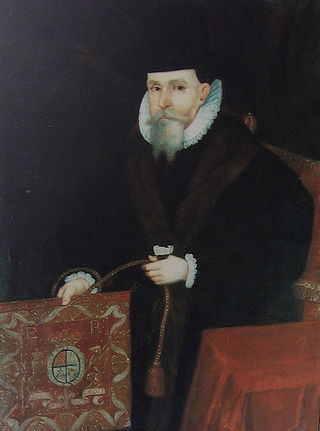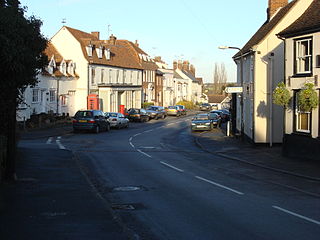Related Research Articles

James Ussher was the Church of Ireland Archbishop of Armagh and Primate of All Ireland between 1625 and 1656. He was a prolific Irish scholar and church leader, who today is most famous for his identification of the genuine letters of the church father, Ignatius of Antioch, and for his chronology that sought to establish the time and date of the creation as "the entrance of the night preceding the 23rd day of October... the year before Christ 4004"; that is, around 6 pm on 22 October 4004 BC, per the proleptic Julian calendar.

Adam Loftus was an English Anglican bishop who was Archbishop of Armagh, and later Dublin, and Lord Chancellor of Ireland from 1581. He was also the first Provost of Trinity College Dublin.
Robert Ball may refer to:
Events in the year 1900 in Ireland.
Richard Meredith was the Church of Ireland Bishop of Leighlin from 1589 until his death.
Wicklow was a constituency representing the parliamentary borough of Wicklow in the Irish House of Commons to 1800.

Henry Ussher was an Irish Protestant churchman, a founder of Trinity College Dublin, and Church of Ireland Archbishop of Armagh.
John Garvey (1527–1595) was an Irish Protestant Bishop of Kilmore and Archbishop of Armagh.

Robert Sibthorp(e) was an Anglican bishop in Ireland during the first half of the seventeenth century.
Robert Ussher was an Irish Protestant bishop who served as the 6th Provost of Trinity College Dublin 1629 to 1634. He was also Bishop of Kildare for some time.
Nehemiah Donnellan was an Irish lawyer and judge.

John Bathe was an Irish barrister and judge. He was a member of a famous legal dynasty, and had a distinguished career under the Tudors, holding office as Solicitor General for Ireland and Chief Justice of the Irish Common Pleas.
Sir William Davys was an Irish barrister and judge who held the offices of Recorder of Dublin, Prime Serjeant and Lord Chief Justice of Ireland. He was suspected of Roman Catholic sympathies and was threatened with removal from the bench as a result, but he succeeded in retaining office until his death, due largely to his influential family connections.
Sir Paul Davys was an Irish politician and civil servant, who held office as Clerk to the Privy Council of Ireland and later as Secretary of State (Ireland). He had considerable influence in public affairs, and enjoyed the close friendship of the Lord Lieutenant, James Butler, 1st Duke of Ormonde. His sons, William and John, both attained high office. He was the grandfather of Paul Davys, 1st Viscount Mount Cashell.
John Challoner MP was the first Secretary of State for Ireland, appointed by Queen Elizabeth I of England in 1560. He also sat at different times as a member of parliament in both the Parliament of England and the Parliament of Ireland. He should not be confused with his contemporary, Alderman John Challoner, Mayor of Dublin between 1556 and 1557, who died in 1565.
Walter Ball was from a wealthy Irish merchant family. His father Bartholomew Ball, his brother Nicholas Ball and sons Robert Ball and Edward Ball all served as Mayor of Dublin. He married Eleanor Ussher, daughter of Alderman Robert Ussher of Santry and his first wife Margaret St. John. He conformed to the established religion (Anglican) to progress politically, and became Commissioner for Ecclesiastical Causes, imposing the Reformation on Dublin. This led to the conflict with his mother, Margaret Ball, whom he imprisoned for recusancy in Dublin Castle, where she endured conditions of appalling squalor for four years. Despite protests from other family members, especially his brother Nicholas, Walter defended his actions, arguing that he had shown clemency by sparing his mother's life, and that she could free herself by swearing the Oath of Supremacy. He remained implacable and during his brother's term as Mayor managed to thwart his efforts to free their mother. Margaret died in prison, and now is venerated as the Blessed Margaret Ball by the Catholic church for being Martyred for her faith.

Nicholas Kerdiffe was an Irish barrister and Law Officer of the early seventeenth century.
William Hilton was an Irish politician, barrister and judge. He is now mainly remembered for his family connection to James Ussher, Archbishop of Armagh, whose sister Anne he married, and who furthered his career.
Sir John Elliott (1546-1617) was an Irish judge of the late sixteenth and early seventeenth centuries, who held office as third Baron of the Court of Exchequer (Ireland). He was also occasionally employed on diplomatic missions. Though his highly successful career was due partly to his own merits, it probably also owed something to his useful family connections, notably with the Rochfort family and the Usshers.
Sir Robert Meredyth was an Irish politician and lawyer who served as Chancellor of the Exchequer of Ireland.
References
- ↑ "History of the Office". Dublin City Council. 9 September 2020. Retrieved 3 May 2023.
- ↑ "Obit: Ball, Robert January 25, 1635". Ireland Genealogy Project Archives. 21 May 2012. Retrieved 4 May 2023.